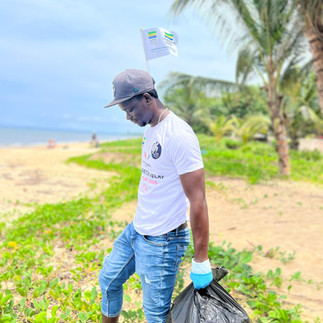Helping sea turtles in Gabon
- William Bolton

- Oct 12, 2025
- 2 min read
Gabon recently hosted a coastal-clean up on the 11th October event as part of the Commonwealth Clean Oceans Plastics Campaign, an initiative championed by the Royal Commonwealth Society in partnership with Commonwealth Sport. This clean-up was timed to coincide with the King’s Baton Relay, ahead of the Commonwealth Games in Glasgow, a reimagined environmental relay that weaves through Commonwealth nations, combining celebration of sport with sustainability.

Gabon’s event was held in the capital, Libreville, on Tropicana Beach, vital nesting site or endangered sea turtles, including the hawksbill turtle, leatherback turtle, olive ridley turtle and green turtle.
The clean-up was coordinated by the Gabonese National Olympic Committee (CNOG) alongside local environmental groups, and community volunteers. Athletes, students, and local residents joined in the collaboration. One of the partners was Projet Tortues Tahiti Gabon, an organisation dedicated to sea turtle conservation. They ran awareness workshops, educating participants about the threats plastic poses to Gabon’s coastal wildlife, especially its nesting turtles.
Research has indicated that 52% of turtles have ingested plastic, which can cause serious issue through blocking the gut and release poisonous chemicals.[1] At particularly high risk are olive ridley turtles, which nest at Tropicana Beach, and which eat jellyfish which can be easily confused with plastic.

Coastal plastic can also pose a danger to turtle hatchlings, through entanglement, which prevents them from reaching the ocean and feeding.[2] Removing plastic from the ocean and coasts is therefore critical to the welfare and stability of sea turtle populations for the future.
The Gabon event demonstrated how local action on plastic pollution can help global problems, such as sea turtle populations. Plastic pollution affects all areas of the world, and can only be addressed through education and global action. As the Baton continues its journey through Commonwealth nations, each stop offers a chance to raise awareness about the impact of marine plastic, to clean up, and to build a legacy of sustainable change.
ABOUT THE CAMPAIGN
The Royal Commonwealth Society’s Commonwealth Clean Oceans Plastics Campaign will prevent one million pieces of plastic from entering Commonwealth waterways.
The campaign will combine education and local action to encourage people to reduce their plastic waste, highlight alternatives, and reduce pollution across the Commonwealth.
For the action component of the campaign, the Royal Commonwealth Society has partnered with Commonwealth Sport to deliver the Commonwealth Clean Oceans Plastics Campaign as a core component of The King’s Baton Relay. This newly envisioned King’s Baton Relay will focus on sustainability and environmentalism and was launched by His Majesty The King at Buckingham Palace on Commonwealth Day 2025, beginning a 500-day journey to the Commonwealth Games in Glasgow in July 2026.
Journeying through every Commonwealth nation and territory, this partnership will bring together young people, athletes, conservation groups, and the local community for a week of activities, including a plastic clean-up.
The views and opinions expressed are those of the author and do not necessarily represent those of the Royal Commonwealth Society.



















